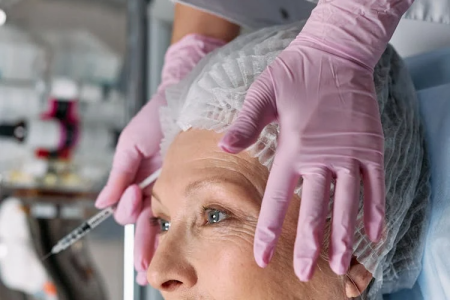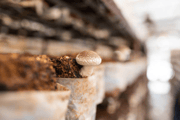Botox was once a Hollywood secret...now it’s a health warning
By
Maan
- Replies 0
A hidden threat is quietly creeping through Australia's beauty industry.
It looks polished on the outside—clean clinics, smiling faces, and affordable prices—but some customers are walking into danger without realising it.
Now, experts are sounding the alarm over counterfeit cosmetic injections that could leave devastating consequences.
The booming cosmetic injectables industry in Australia—worth $4.1 billion in 2023—had a darker side that few saw coming.
In recent months, authorities seized two counterfeit batches of botulinum toxin, also known as botox, from the border.
Though the packaging looked legitimate, eagle-eyed officials from the Therapeutic Goods Administration (TGA) spotted typos and confirmed the batch numbers were fakes.
The TGA stated the products were ordered from overseas and refused to disclose where or when the seizure occurred, or which business had placed the order, due to ongoing investigations.
Dr Vivek Eranki, a national cosmetic clinic operator, described the issue as a ‘hidden problem’ because it was so easy for rogue practitioners to pass off counterfeit substances as authentic.
‘This is more of a hidden problem, in that it is very easy for practitioners to pass it off as they are using a real product — but not documenting exactly what’s been used,’ he told NewsWire.
He said some operators were deliberately falsifying records and disguising what they were really injecting.
‘People can put in false information if they are trying to cover their tracks and this is what makes it so scary,’ he added.
‘We know there are fake products coming in and it is very easy to hide it.’
The TGA released images of the seized vials, which were nearly indistinguishable from legitimate packaging.
The Australian Medical Association responded to the discovery, urging Australians to seek qualified practitioners only.
‘The AMA reminds Australians that all medical procedures, including cosmetic injections, carry risk and should only be performed by suitably qualified health practitioners,’ a spokeswoman said.
‘Anyone planning a procedure should ensure they understand the skills and qualifications of the person undertaking the procedure.’
Dr Eranki warned people not to cut corners for the sake of convenience or cost.
‘Never go to somebody’s house, never go to a hair salon to get your treatment done,’ he said.
‘Make sure that whoever’s doing your treatment is adequately trained and qualified.’
He stressed that regulatory bodies could only go so far, and that individuals must use common sense.
‘At the end of the day the governmental infrastructure, the regulators, the authorities can only do so much. At some point, common sense needs to take over. And I think that’s where the solution lies.’
The dangers were more than theoretical.
In January, three Sydney women were hospitalised with botulism infections after undergoing cosmetic injections—one required intensive care.
The Health Care Complaints Commission later issued a permanent prohibition order against the unregistered injector, Norsafiza Binti Zakaria, who had advertised under at least six aliases.
The Australian Health Practitioner Regulation Agency (AHPRA) ramped up efforts in recent months, conducting raids across homes and commercial premises to seize illegal injectables.
From September 2022 to March 2025, AHPRA received 360 complaints related to non-surgical cosmetic procedures.
The complaints involved a broad range of health workers, including doctors, nurses, midwives, dentists, psychologists and Chinese medicine practitioners.
AHPRA encouraged patients to trust their instincts and do their homework before undergoing any procedures.
‘If something doesn’t feel right then patients should trust their gut and hit pause,’ a spokesperson said.
‘Patients should ensure that their injector is a registered health practitioner by asking for their registration number and looking them up on the national register of practitioners.’
If you thought fake injectables were a one-off concern, think again.
The issue has been bubbling under the surface for some time, and recent developments show it’s far from going away.
One such case prompted a formal alert from the nation’s top medical regulator after counterfeit cosmetic vials were intercepted at the border.
Read more: TGA warns about fake Botox after border seizure sparks safety alert

Could a cheap beauty treatment end up costing you your health?
It looks polished on the outside—clean clinics, smiling faces, and affordable prices—but some customers are walking into danger without realising it.
Now, experts are sounding the alarm over counterfeit cosmetic injections that could leave devastating consequences.
The booming cosmetic injectables industry in Australia—worth $4.1 billion in 2023—had a darker side that few saw coming.
In recent months, authorities seized two counterfeit batches of botulinum toxin, also known as botox, from the border.
Though the packaging looked legitimate, eagle-eyed officials from the Therapeutic Goods Administration (TGA) spotted typos and confirmed the batch numbers were fakes.
The TGA stated the products were ordered from overseas and refused to disclose where or when the seizure occurred, or which business had placed the order, due to ongoing investigations.
Dr Vivek Eranki, a national cosmetic clinic operator, described the issue as a ‘hidden problem’ because it was so easy for rogue practitioners to pass off counterfeit substances as authentic.
‘This is more of a hidden problem, in that it is very easy for practitioners to pass it off as they are using a real product — but not documenting exactly what’s been used,’ he told NewsWire.
He said some operators were deliberately falsifying records and disguising what they were really injecting.
‘People can put in false information if they are trying to cover their tracks and this is what makes it so scary,’ he added.
‘We know there are fake products coming in and it is very easy to hide it.’
The TGA released images of the seized vials, which were nearly indistinguishable from legitimate packaging.
The Australian Medical Association responded to the discovery, urging Australians to seek qualified practitioners only.
‘The AMA reminds Australians that all medical procedures, including cosmetic injections, carry risk and should only be performed by suitably qualified health practitioners,’ a spokeswoman said.
‘Anyone planning a procedure should ensure they understand the skills and qualifications of the person undertaking the procedure.’
Dr Eranki warned people not to cut corners for the sake of convenience or cost.
‘Never go to somebody’s house, never go to a hair salon to get your treatment done,’ he said.
‘Make sure that whoever’s doing your treatment is adequately trained and qualified.’
He stressed that regulatory bodies could only go so far, and that individuals must use common sense.
‘At the end of the day the governmental infrastructure, the regulators, the authorities can only do so much. At some point, common sense needs to take over. And I think that’s where the solution lies.’
The dangers were more than theoretical.
In January, three Sydney women were hospitalised with botulism infections after undergoing cosmetic injections—one required intensive care.
The Health Care Complaints Commission later issued a permanent prohibition order against the unregistered injector, Norsafiza Binti Zakaria, who had advertised under at least six aliases.
The Australian Health Practitioner Regulation Agency (AHPRA) ramped up efforts in recent months, conducting raids across homes and commercial premises to seize illegal injectables.
From September 2022 to March 2025, AHPRA received 360 complaints related to non-surgical cosmetic procedures.
The complaints involved a broad range of health workers, including doctors, nurses, midwives, dentists, psychologists and Chinese medicine practitioners.
AHPRA encouraged patients to trust their instincts and do their homework before undergoing any procedures.
‘If something doesn’t feel right then patients should trust their gut and hit pause,’ a spokesperson said.
‘Patients should ensure that their injector is a registered health practitioner by asking for their registration number and looking them up on the national register of practitioners.’
If you thought fake injectables were a one-off concern, think again.
The issue has been bubbling under the surface for some time, and recent developments show it’s far from going away.
One such case prompted a formal alert from the nation’s top medical regulator after counterfeit cosmetic vials were intercepted at the border.
Read more: TGA warns about fake Botox after border seizure sparks safety alert
Key Takeaways
- Two counterfeit batches of botox were seized by authorities in recent months.
- The fake vials were purchased from overseas and mimicked real packaging.
- AHPRA received 360 complaints about cosmetic injectables over two and a half years.
- Experts urged Australians to verify practitioner qualifications and avoid informal settings like homes and salons.
Could a cheap beauty treatment end up costing you your health?








